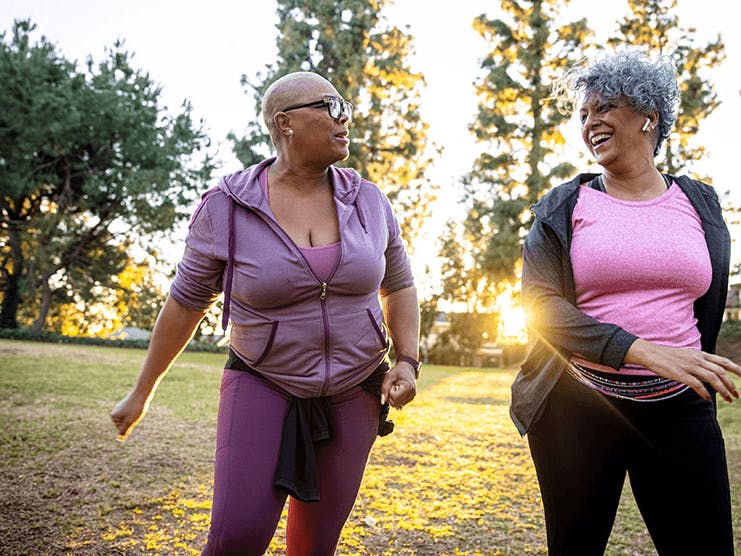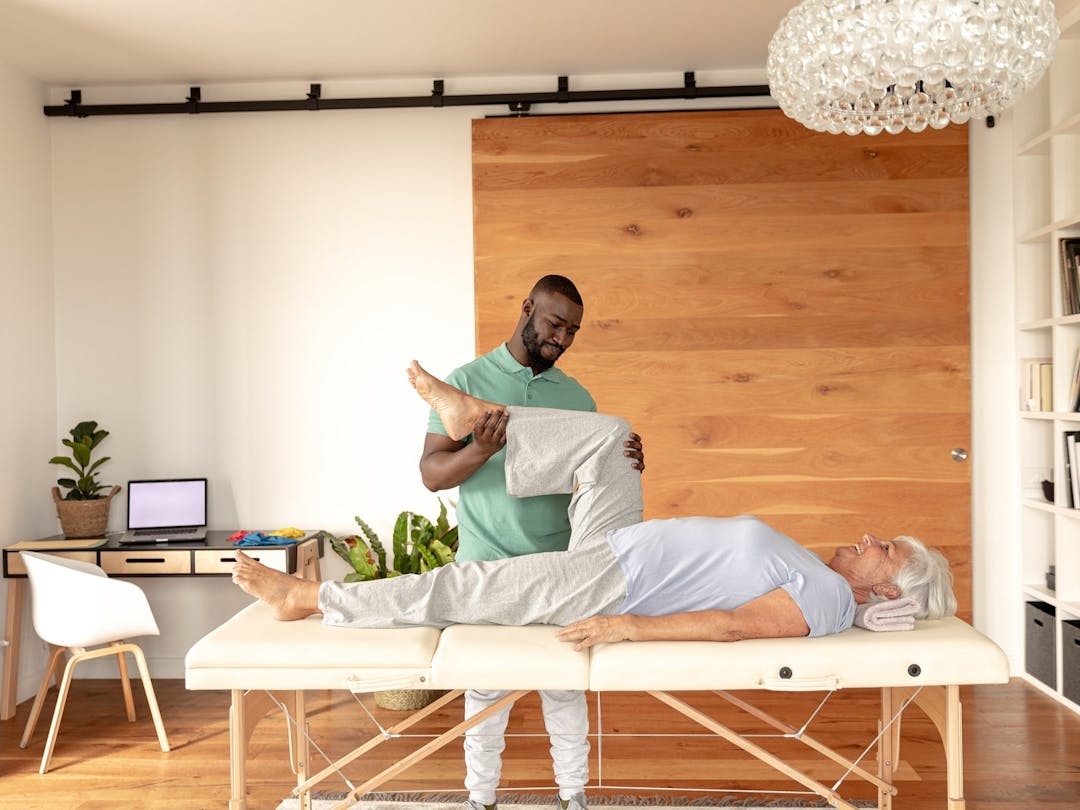
Research shows how a simple half-hour routine could impact your health and happiness.
You probably take walking for granted. Most people do. But it's a powerful skill: Use it often, and it will continue to be available to you for decades to come.
"Walking is something that you learn to do around age 1, and many individuals can continue to do it until age 95," says Jordan D. Metzl, M.D., a sports medicine physician at the Hospital for Special Surgery in New York. He's also the author of The Exercise Cure. "Walking doesn't only add more years to your life, but it also adds more life to your years."
How many steps do you really need?
You've probably heard about the 10,000-step goal. Many people consider that to be the number to hit daily for improved health. But where did it come from?
Turns out it started as part of a 1960s marketing campaign in Japan, where a pedometer called Manpo-kei (translation: "10,000 steps meter") aimed to give people a benchmark that was challenging—but not too challenging. They still had to sell pedometers, after all.
Since then, 10,000 steps has grown into an accepted measure of daily activity. But that doesn't mean it's necessarily right for you. For a more practical goal, Dr. Metzl recommends measuring your walks by time. "Walking for a minimum of 30 minutes a day is a good way to think about it," says Dr. Metzl. "Do what's comfortable for you in that time."
Walking as medicine
Exercise is truly the best medicine. That's not hyperbole, says Dr. Metzl. "Walking can be very powerful—better than many medications at the pharmacy," he says. The simple act of putting one foot in front of the other can replace Prozac as a mood booster and make Ambien unnecessary for sleep. It can also lower your blood pressure and blood sugar.
We dug into the studies and found six science-backed reasons to walk for at least half an hour every day. If the new habit is hard at first, stick with it: In a few weeks, you won't want to go a day without your walk.
1. Walking can improve memory and cognitive function
A study of nearly 300 people published in the journal Neurology suggests that walking could stave off cognitive decline. The researchers found that people, average age 78, who regularly walked 72 blocks per week had measurably higher levels of gray matter in their brains.
Why is this important? Because gray matter "houses the neuroanatomy involved in thinking, solving problems, and processing information," says Michele Olson, Ph.D., a senior clinical professor of sports science at Huntingdon College in Montgomery, Ala. So gray matter is a measure of brain power. "It helps to maintain our brain function and related thinking activities, such as using our memories," says Olson.
Dr. Metzl also points out that walking has been shown to slow the progression of Alzheimer's. "Across all spectrums of the body, walking is very powerful," he says.
2. Walking can counteract the effects of weight-promoting genes
"Our bodies are very responsive to moderate-intensity exercise," says Olson. "When we walk, our hormonal milieu changes for the better. That has an impact on genes that prevent weight gain and decrease our risk of inherited diseases." That includes obesity.
A study from Harvard and the American Heart Association confirmed this. The researchers looked at a subset of genes linked to obesity in a group of roughly 12,000 people. Among those who walked for about an hour a day, the effect of the obesity genes was cut in half. Even if you don't have time for that much, any amount of regular walking will help.
3. Walking can lower your risk of heart disease
Heart disease is the leading cause of death in the United States, according to the Centers for Disease Control and Prevention. But you can outrun—or rather, outwalk—the risk. "Walking and exercise can reduce the expression of heart disease, preventing it from worsening or even happening in general," says Dr. Metzl.
To his point, a 2019 study from the Centers for Disease Control and Prevention found that people who reported any amount of leisure walking at all—even just 10 minutes for the entire week prior to the study—were 34% less likely to have cardiovascular disease.
4. Walking can lower your body mass index
Body mass index, or BMI, is a measure of body size that tells clinicians whether a person is a healthy weight, underweight, or overweight.
For a study published the Journal of Physical Therapy Science, researchers asked a group of overweight people to adopt a walking routine for four months. During that time, their average BMI decreased from 26.8 to 25.9. At the same time, they lost abdominal fat and overall fat mass.
Olson notes that you can even use short walks to break up long periods of sitting on the couch. "Sitting puts increased pressure on our spines, and our major leg and gluteal muscles become inactive and may not fire properly," she says. Walking gets our body extended and moving, and in turn, it increases our metabolic rate by about 15 times. "So [with walking], we can maintain a healthier BMI and reduce calorie storage in our fat cells."
5. Walking can make you happier
You can amplify the effects of walking by heading to a local hiking trail, according to a study from Stanford University. When researchers scanned the brains of people who'd recently been walking in green spaces—such as woods and parks—they discovered a significant reduction of activity in areas related to self-focused behavior and negative rumination.
"Being outdoors, breathing fresh air, and being exposed to sunshine all help our sleep schedules, our biological clocks, and our mood state," says Olson.
6. Walking can add years to your life
Physical activity of any kind can help you live longer: Olson estimates that people who exercise regularly at a moderate intensity will outlive sedentary people by about six years. And according to a review of studies published in the International Journal of Behavioral Nutrition and Physical Activity, walking is slightly more effective than cycling at reducing the risk mortality during a set time period.
"Our bodies are amazing machines, similar to a well-kept car," says Olson. And just as cars need routine oil changes, brake pads, and new tires, we need exercise. "When you engage in a walking routine that gets your heart pumping, it makes you a better living machine," she says.
Additional resources
- ClearMatch Medicare: Find a Medicare Plan
- Neurology: Physical Activity Predicts Gray Matter Volume
- Science Daily: Walking May Lessen the Influence of Genes on Obesity
- Centers for Disease Control & Prevention: Preventing Chronic Disease
- Journal of Physical Therapy Science: Effects of Walking Exercise Program for Obese Individuals
- Proceedings of the National Academy of Sciences: Nature Experience Reduces Rumination...
- International Journal of Behavioral Nutrition and Physical Activity: Systematic review and meta-analysis of reduction in all-cause mortality from walking and cycling and shape of dose response relationship


